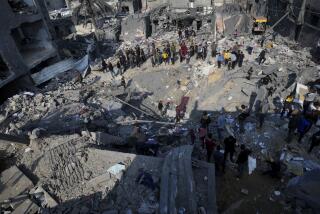Despite Arab Jitters, Baker Continues to Insist on a Security Structure for Persian Gulf Region : Geopolitics: No matter how the crisis ends, he contends, Iraq must be prevented from renewing its aggression.
- Share via
WASHINGTON — When Secretary of State James A. Baker III proposed a NATO-style security structure that would extend the U.S. military presence in the Persian Gulf beyond the end of the Iraq-Kuwait crisis, he hoped to reassure American allies and worry Iraq’s Saddam Hussein.
As it turned out, the idea produced far more anxiety in Saudi Arabia and the other gulf states than it did in Iraq. Baker quickly backtracked from the NATO analogy and admitted that he was really just thinking aloud in his comments to the House Foreign Affairs Committee.
Nevertheless, in almost three weeks since his Sept. 4 appearance on Capitol Hill, Baker has repeated, refined and reinforced his basic premise: No matter how the current crisis ends, new security measures must be adopted in the gulf to prevent Iraq from renewing its aggression, especially if the Baghdad regime gets out of the confrontation with its army intact.
Stated that way, few could object to the premise. But no one in the Administration seems to know how the objective can be accomplished. And the idea of a single security structure--no matter how it might be shaped--has been virtually abandoned as unworkable.
Instead, Administration officials now are talking about a wide range of measures, such as a long-term embargo on the sale to Iraq of military technology and a massive redistribution of wealth from oil-rich sheiks to their dirt-poor neighbors to rob future demagogues of the economic resentment that Hussein has tried so hard to exploit. Some officials even talk about a renewed effort to cure the Middle East’s “core problems,” particularly the Israeli-Palestinian dispute.
All of this is reminiscent of the sort of utopian “after-the-war” thinking that has produced disillusionment in the past. Officials talk about the opportunities presented by the gulf crisis, forgetting that the region’s most difficult problems have very little to do with Iraq’s invasion of Kuwait.
They have realized, however, that the region’s problems do not lend themselves well to the concept of a single security structure. “I just don’t think it will be one organization,” a senior State Department official said. “We don’t have in mind any single security structure. European models don’t apply.”
One reason there can be no single organization, he acknowledged, is that no one has been able to determine a role for Israel. Arab-Israeli hostility would seem to preclude the inclusion of the Jewish state in a predominantly Arab organization, but a Middle East security structure that does not include the region’s most potent military force is equally inconceivable.
The current centerpiece of American post-crisis planning is economic rather than military. Saudi Arabia, the United Arab Emirates and the exiled government of Kuwait have agreed to provide $6 billion in aid to countries that have been hard hit by the embargo against Iraq, in addition to about $6 billion to defray the cost of U.S. military operations.
If the rich gulf states can be persuaded to continue their wartime generosity, the official said, they could reduce the economic disparities of the region and deprive Hussein of one of his most appealing arguments.
“It is not enough to demonstrate that (Hussein’s) way won’t work,” the official said. “We have to show that other ways work better.”
When Baker first raised the issue, however, the focus was on ways to contain Iraq in the event that the crisis ends peacefully, leaving Hussein with a massive army, a frightening arsenal of chemical weapons and an emerging nuclear arms industry.
What is needed, Baker said, is a long-term structure--with American participation--that could frustrate Hussein’s ambitions. Although he did not exactly call his plan a NATO for the gulf, he drew an unmistakable comparison. When a lawmaker suggested that no regional organization could deal with a nuclear-armed Iraq, Baker said, “It worked in Europe. The Soviet Union had nuclear weapons going back to Stalin’s time.”
The next day, in an appearance before the Senate Foreign Relations Committee, Baker thought better of the NATO analogy. He said it would be impossible to transplant the North Atlantic Treaty Organization to the gulf.
Later that week, Saudi Arabia’s King Fahd bluntly told Baker that his kingdom would have nothing to do with a formal organization like NATO. And the king made it clear that he wanted American ground troops to go home as soon as the crisis ends.
“What he (Baker) has is a good idea, but the way he said it and the forum in which he said it set off a lot of alarm bells,” a State Department official said. He added that the plan was devised by Baker and a few top advisers instead of coming up through the State Department bureaucracy.
In his original presentation, Baker said the United States should maintain a military presence in the post-crisis gulf. He later suggested that the Soviet Union could play a similar role.
After the Saudis made it clear that they do not want a permanent contingent of American troops, Baker and other U.S. officials said it would be enough for the United States to maintain a naval presence in the gulf, as it has done since 1947. For the time being, officials said, the naval armada would be far more extensive than it has been for most of the past 43 years.
A senior Administration official said Washington could safely withdraw all of its ground forces because “we have already demonstrated that we can get them there pretty fast.” He said the U.S. ability to deploy quickly to the gulf would be almost as much of a deterrent to Iraq as a garrison of ground troops.
Geoffrey Kemp, a former National Security Council expert on the Middle East, said the key question is how visible the U.S. forces would be.
“There will be a need for some long-term commitment for rapid redeployment and possibly some permanent stationing of air elements,” said Kemp, now a scholar at the Carnegie Endowment for International Peace in Washington. “A permanent American ground presence would be highly controversial and probably counterproductive.”
Of course, the shape of the post-crisis world will be determined in large measure by the way in which the confrontation plays itself out. Consequences of war would be far different from those of a peaceful solution. Nevertheless, some advance planning is clearly needed.
“We are not a nation of chess players,” said George Carver, a former deputy director of the CIA. “(President) Bush made exactly the right moves to Saddam’s opening gambit. But you have to think about your board position five or six moves in advance. And you have to give some thought to the end game.
“I think we ought to take advantage of the mood of alliance and cooperation, which will have a very short half-life, to address some of the Middle East’s festering sores, notably the Palestinian problem and Lebanon,” Carver said.
Other experts, both in and out of the Administration, called for renewed efforts to settle the Arab-Israeli dispute as soon as the gulf crisis ends, even though the two issues seem to have very little in common beyond simple geography. A senior State Department official said a renewed effort to jump-start the Israeli-Palestinian peace process is high on the Administration’s post-crisis priority list.
William B. Quandt, a former National Security Council expert on the Middle East, said the Administration should try to take advantage of Syria’s presence in the U.S.-led multinational military force to urge negotiations between Israel and President Hafez Assad’s regime.
“In the post-crisis period, it will be worth concentrating more on the Syrian-Israeli front and putting the Israeli-Palestinian dispute on the back burner,” said Quandt, now a scholar at the Brookings Institution in Washington. “There might be a chance of getting (Israeli Prime Minister Yitzhak) Shamir’s government into negotiations with the Syrians. That would be a lot easier than getting them to talk about something for the West Bank.”
In the past, Israel has said it is ready to negotiate with any Arab nation, but it has been reluctant to enter a dialogue with Palestinian representatives.
More to Read
Get the L.A. Times Politics newsletter
Deeply reported insights into legislation, politics and policy from Sacramento, Washington and beyond. In your inbox twice per week.
You may occasionally receive promotional content from the Los Angeles Times.









